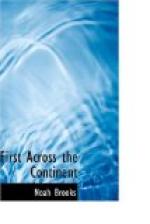On the third of December Captain Clark carved on the trunk of a great pine tree this inscription:—
“Wm. Clark December 3D 1805 by land from the
U. States in 1804 & 5.”
A few days later, Captain Lewis took with him a small party and set out to find a suitable spot on which to build their winter camp. He did not return as soon as he was expected, and considerable uneasiness was felt in camp on that account. But he came in safely. He brought good news; they had discovered a river on the south side of the Columbia, not far from their present encampment, where there were an abundance of elk and a favorable place for a winter camp. Bad weather detained them until the seventh of December, when a favorable change enabled them to proceed. They made their way slowly and very cautiously down-stream, the tide being against them. The narrative proceeds:—
“We at length turned a point, and found ourselves in a deep bay: here we landed for breakfast, and were joined by the party sent out three days ago to look for the six elk, killed by the Lewis party. They had lost their way for a day and a half, and when they at last reached the place, found the elk so much spoiled that they brought away nothing but the skins of four of them. After breakfast we coasted round the bay, which is about four miles across, and receives, besides several small creeks, two rivers, called by the Indians, the one Kilhowanakel, the other Netul. We named it Meriwether’s Bay, from the Christian name of Captain Lewis, who was, no doubt, the first white man who had surveyed it. The wind was high from the northeast, and in the middle of the day it rained for two hours, and then cleared off. On reaching the south side of the bay we ascended the Netul three miles, to the first point of high land on its western bank, and formed our camp in a thick grove of lofty pines, about two hundred yards from the water, and thirty feet above the level of the high tides.”
Chapter XVIII — Camping by the Pacific
Next in importance to the building of a winter camp was the fixing of a place where salt could be made. Salt is absolutely necessary for the comfort of man, and the supply brought out from the United States by the explorers was now nearly all gone. They were provided with kettles in which sea-water could be boiled down and salt be made. It would be needful to go to work at once, for the process of salt-making by boiling in ordinary kettles is slow and tedious; not only must enough for present uses be found, but a supply to last the party home again was necessary. Accordingly, on the eighth of December the journal has this entry to show what was to be done:—




